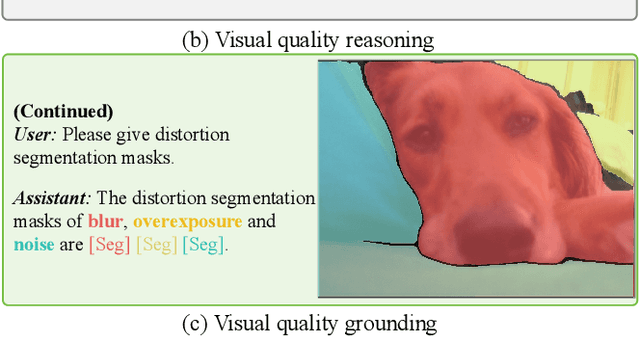Q-Ground: Image Quality Grounding with Large Multi-modality Models
Paper and Code
Jul 24, 2024



Recent advances of large multi-modality models (LMM) have greatly improved the ability of image quality assessment (IQA) method to evaluate and explain the quality of visual content. However, these advancements are mostly focused on overall quality assessment, and the detailed examination of local quality, which is crucial for comprehensive visual understanding, is still largely unexplored. In this work, we introduce Q-Ground, the first framework aimed at tackling fine-scale visual quality grounding by combining large multi-modality models with detailed visual quality analysis. Central to our contribution is the introduction of the QGround-100K dataset, a novel resource containing 100k triplets of (image, quality text, distortion segmentation) to facilitate deep investigations into visual quality. The dataset comprises two parts: one with human-labeled annotations for accurate quality assessment, and another labeled automatically by LMMs such as GPT4V, which helps improve the robustness of model training while also reducing the costs of data collection. With the QGround-100K dataset, we propose a LMM-based method equipped with multi-scale feature learning to learn models capable of performing both image quality answering and distortion segmentation based on text prompts. This dual-capability approach not only refines the model's understanding of region-aware image quality but also enables it to interactively respond to complex, text-based queries about image quality and specific distortions. Q-Ground takes a step towards sophisticated visual quality analysis in a finer scale, establishing a new benchmark for future research in the area. Codes and dataset are available at https://github.com/Q-Future/Q-Ground.
 Add to Chrome
Add to Chrome Add to Firefox
Add to Firefox Add to Edge
Add to Edge